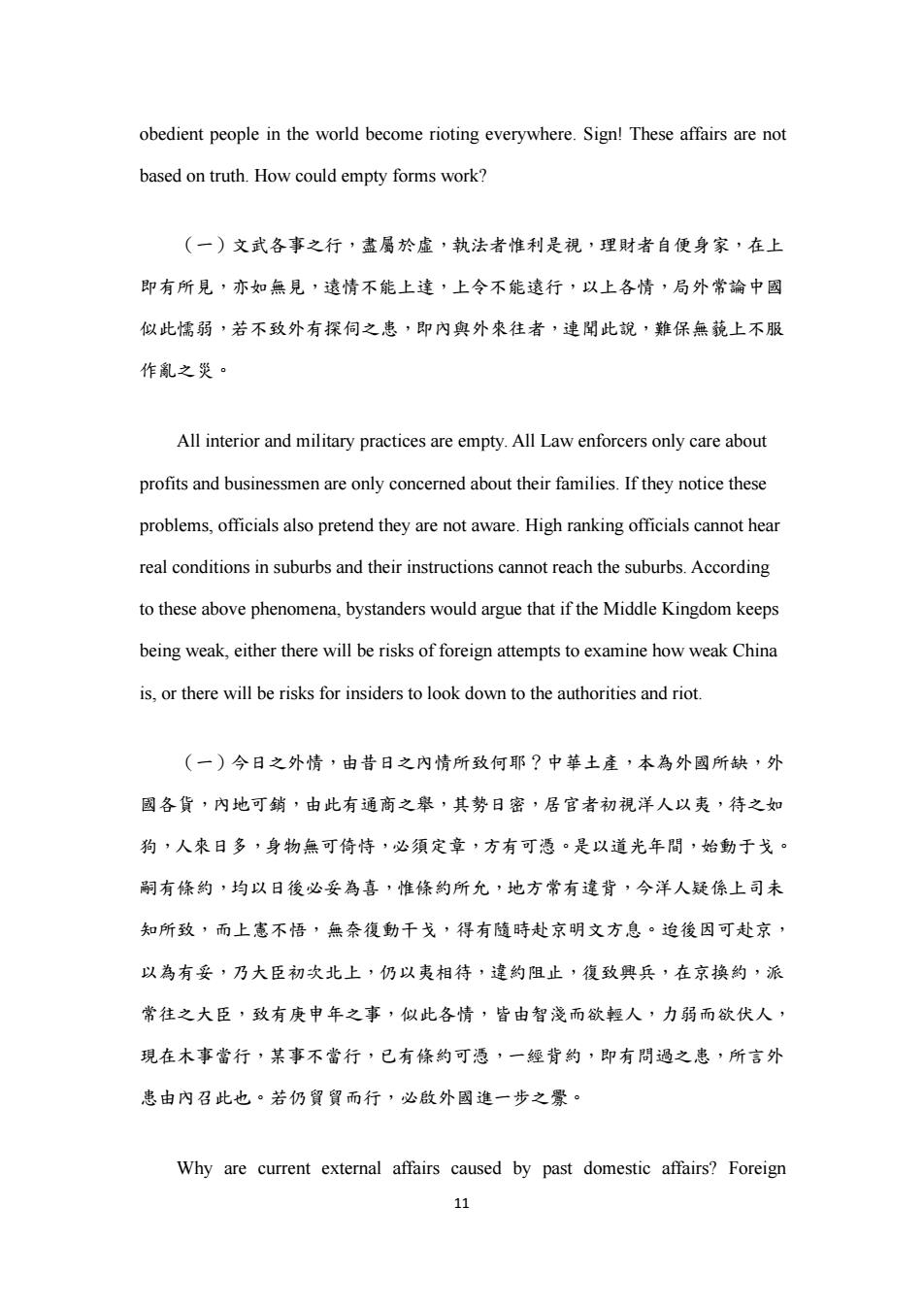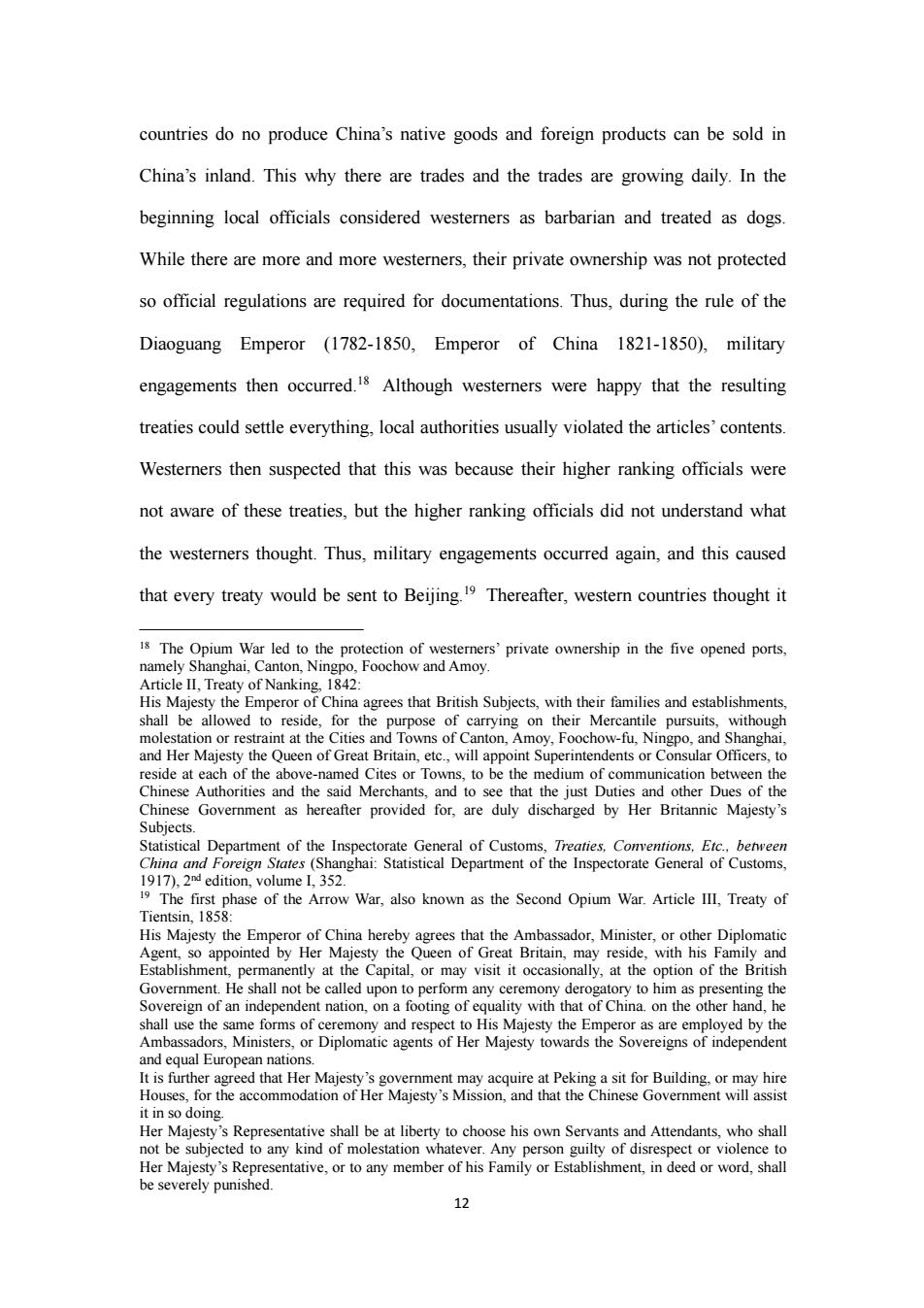
obedient people in the world become rioting everywhere.Sign!These affairs are not based on truth.How could empty forms work? (一)文武各事之行,盡屬於虛,執法者惟利是視·理財者自便身家,在上 即有所見,亦如無見,遠情不能上達’上令不能遠行,以上各情,局外常論中國 似此懦弱,若不致外有探伺之患,即內與外來往者,連聞此說,難保無藐上不服 作亂之災· All interior and military practices are empty.All Law enforcers only care about profits and businessmen are only concerned about their families.If they notice these problems,officials also pretend they are not aware.High ranking officials cannot hear real conditions in suburbs and their instructions cannot reach the suburbs.According to these above phenomena,bystanders would argue that if the Middle Kingdom keeps being weak,either there will be risks of foreign attempts to examine how weak China is,or there will be risks for insiders to look down to the authorities and riot. (一)今日之外情,由昔日之内情所致何耶?中華土產,本為外國所缺,外 國各貨,內地可銷,由此有通商之舉,其勢日密,居官者初視洋人以夷’待之如 狗,人來日多,身物無可倚恃’必須定章,方有可憑。是以道光年間,始動于戈· 嗣有條約·均以日後必妥為喜·惟條約所允·地方常有違背,今洋人疑係上司未 知所致,而上意不悟,無奈復動千戈,得有隨時赴京明文方息。迨後因可赴京, 以為有妥,乃大臣初次北上,仍以夷相待,違約阻止,復致興兵,在京换約,派 常往之大臣’致有庚申年之事,似此各情,皆由智淺而欲輕人,力弱而欲伏人’ 現在木事當行’某事不當行,已有條約可憑,一經背約,即有問過之患·所言外 患由內召此也·若仍貿貿而行,必啟外國進一步之釁。 Why are current external affairs caused by past domestic affairs?Foreign 11
11 obedient people in the world become rioting everywhere. Sign! These affairs are not based on truth. How could empty forms work? (一)文武各事之行,盡屬於虛,執法者惟利是視,理財者自便身家,在上 即有所見,亦如無見,遠情不能上達,上令不能遠行,以上各情,局外常論中國 似此懦弱,若不致外有探伺之患,即內與外來往者,連聞此說,難保無藐上不服 作亂之災。 All interior and military practices are empty. All Law enforcers only care about profits and businessmen are only concerned about their families. If they notice these problems, officials also pretend they are not aware. High ranking officials cannot hear real conditions in suburbs and their instructions cannot reach the suburbs. According to these above phenomena, bystanders would argue that if the Middle Kingdom keeps being weak, either there will be risks of foreign attempts to examine how weak China is, or there will be risks for insiders to look down to the authorities and riot. (一)今日之外情,由昔日之內情所致何耶?中華土產,本為外國所缺,外 國各貨,內地可銷,由此有通商之舉,其勢日密,居官者初視洋人以夷,待之如 狗,人來日多,身物無可倚恃,必須定章,方有可憑。是以道光年間,始動于戈。 嗣有條約,均以日後必妥為喜,惟條約所允,地方常有違背,今洋人疑係上司未 知所致,而上憲不悟,無奈復動干戈,得有隨時赴京明文方息。迨後因可赴京, 以為有妥,乃大臣初次北上,仍以夷相待,違約阻止,復致興兵,在京換約,派 常往之大臣,致有庚申年之事,似此各情,皆由智淺而欲輕人,力弱而欲伏人, 現在木事當行,某事不當行,已有條約可憑,一經背約,即有問過之患,所言外 患由內召此也。若仍貿貿而行,必啟外國進一步之釁。 Why are current external affairs caused by past domestic affairs? Foreign

countries do no produce China's native goods and foreign products can be sold in China's inland.This why there are trades and the trades are growing daily.In the beginning local officials considered westerners as barbarian and treated as dogs. While there are more and more westerners,their private ownership was not protected so official regulations are required for documentations.Thus,during the rule of the Diaoguang Emperor (1782-1850,Emperor of China 1821-1850),military engagements then occurred.18 Although westerners were happy that the resulting treaties could settle everything,local authorities usually violated the articles'contents. Westerners then suspected that this was because their higher ranking officials were not aware of these treaties,but the higher ranking officials did not understand what the westerners thought.Thus,military engagements occurred again,and this caused that every treaty would be sent to Beijing.19 Thereafter,western countries thought it is The Opium War led to the protection of westerners'private ownership in the five opened ports, namely Shanghai,Canton,Ningpo,Foochow and Amoy. Article II,Treaty of Nanking,1842: His Majesty the Emperor of China agrees that British Subjects,with their families and establishments. shall be allowed to reside,for the purpose of carrying on their Mercantile pursuits,withough molestation or restraint at the Cities and Towns of Canton,Amoy,Foochow-fu,Ningpo,and Shanghai, and Her Majesty the Queen of Great Britain,etc.,will appoint Superintendents or Consular Officers,to reside at each of the above-named Cites or Towns,to be the medium of communication between the Chinese Authorities and the said Merchants,and to see that the just Duties and other Dues of the Chinese Government as hereafter provided for,are duly discharged by Her Britannic Majesty's Subjects. Statistical Department of the Inspectorate General of Customs,Treaties,Conventions,Etc.,between China and Foreign States(Shanghai:Statistical Department of the Inspectorate General of Customs, 1917).2nd edition,volume I.352. 19 The first phase of the Arrow War,also known as the Second Opium War.Article III,Treaty of Tientsin.1858: His Majesty the Emperor of China hereby agrees that the Ambassador,Minister,or other Diplomatic Agent,so appointed by Her Majesty the Queen of Great Britain,may reside,with his Family and Establishment,permanently at the Capital,or may visit it occasionally,at the option of the British Government.He shall not be called upon to perform any ceremony derogatory to him as presenting the Sovereign of an independent nation,on a footing of equality with that of China.on the other hand,he shall use the same forms of ceremony and respect to His Majesty the Emperor as are employed by the Ambassadors,Ministers,or Diplomatic agents of Her Majesty towards the Sovereigns of independent and equal European nations. It is further agreed that Her Majesty's government may acquire at Peking a sit for Building,or may hire Houses,for the accommodation of Her Majesty's Mission,and that the Chinese Government will assist it in so doing. Her Majesty's Representative shall be at liberty to choose his own Servants and Attendants,who shall not be subjected to any kind of molestation whatever.Any person guilty of disrespect or violence to Her Majesty's Representative,or to any member of his Family or Establishment,in deed or word,shall be severely punished. 12
12 countries do no produce China’s native goods and foreign products can be sold in China’s inland. This why there are trades and the trades are growing daily. In the beginning local officials considered westerners as barbarian and treated as dogs. While there are more and more westerners, their private ownership was not protected so official regulations are required for documentations. Thus, during the rule of the Diaoguang Emperor (1782-1850, Emperor of China 1821-1850), military engagements then occurred.18 Although westerners were happy that the resulting treaties could settle everything, local authorities usually violated the articles’ contents. Westerners then suspected that this was because their higher ranking officials were not aware of these treaties, but the higher ranking officials did not understand what the westerners thought. Thus, military engagements occurred again, and this caused that every treaty would be sent to Beijing.19 Thereafter, western countries thought it 18 The Opium War led to the protection of westerners’ private ownership in the five opened ports, namely Shanghai, Canton, Ningpo, Foochow and Amoy. Article II, Treaty of Nanking, 1842: His Majesty the Emperor of China agrees that British Subjects, with their families and establishments, shall be allowed to reside, for the purpose of carrying on their Mercantile pursuits, withough molestation or restraint at the Cities and Towns of Canton, Amoy, Foochow-fu, Ningpo, and Shanghai, and Her Majesty the Queen of Great Britain, etc., will appoint Superintendents or Consular Officers, to reside at each of the above-named Cites or Towns, to be the medium of communication between the Chinese Authorities and the said Merchants, and to see that the just Duties and other Dues of the Chinese Government as hereafter provided for, are duly discharged by Her Britannic Majesty’s Subjects. Statistical Department of the Inspectorate General of Customs, Treaties, Conventions, Etc., between China and Foreign States (Shanghai: Statistical Department of the Inspectorate General of Customs, 1917), 2 nd edition, volume I, 352. 19 The first phase of the Arrow War, also known as the Second Opium War. Article III, Treaty of Tientsin, 1858: His Majesty the Emperor of China hereby agrees that the Ambassador, Minister, or other Diplomatic Agent, so appointed by Her Majesty the Queen of Great Britain, may reside, with his Family and Establishment, permanently at the Capital, or may visit it occasionally, at the option of the British Government. He shall not be called upon to perform any ceremony derogatory to him as presenting the Sovereign of an independent nation, on a footing of equality with that of China. on the other hand, he shall use the same forms of ceremony and respect to His Majesty the Emperor as are employed by the Ambassadors, Ministers, or Diplomatic agents of Her Majesty towards the Sovereigns of independent and equal European nations. It is further agreed that Her Majesty’s government may acquire at Peking a sit for Building, or may hire Houses, for the accommodation of Her Majesty’s Mission, and that the Chinese Government will assist it in so doing. Her Majesty’s Representative shall be at liberty to choose his own Servants and Attendants, who shall not be subjected to any kind of molestation whatever. Any person guilty of disrespect or violence to Her Majesty’s Representative, or to any member of his Family or Establishment, in deed or word, shall be severely punished